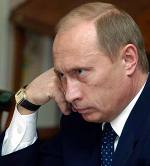
With Vladimir Putin preparing to rule as a true autocrat, and with the well-known attempts to create a Republican autocracy in the U.S., I think this is a good time to talk about the real price of autocracy.
It’s not what you think.
What you’re probably thinking about is the unfairness of it all, or the police state trappings of any autocracy, whether ideological, religious, or merely personal in character. Maybe you’re thinking of great books like Orwell’s 1984.
You’re wrong.
The real cost is a loss of flexibility. It’s the ability to change, to adapt to new circumstances, which allows a democratic, capitalist, and socially messy system to thrive, while slowly trampling autocracies of all sorts underfoot.

In many ways, history shows that autocracy may be more natural to
people than democracy. Until the industrial revolution began
accelerating the pace of change, late in the 18th century, autocracies,
usually in the form of monarchy, were the natural order of things.
At the time of the Bible, in fact, it seemed no other system could
be conceived of, and so we talk of a "Kingdom" of God, and a Catholic
Church run as an absolute monarchy, even though that monarch is elected
by a College of Cardinals.
Yet even after the 18th century we created new forms of autocracy.
Fascism. Nazism. Communism. Each favored a "dictatorship" of one form
or another — of the rich, of the party, of the proletariat. Each
failed, utterly.
The failure is seen best in that of Communism. In both Russia and
China it developed into a self-perpetuating clique that refused to
listen, on ideological grounds, to any competing ideas. The Russian
version collapsed with the Berlin Wall, and its return under Putin is
based entirely on oil wealth, making Putin’s government, in effect, no
different than the Saudi autocracy of Arabia. The Chinese version has
collapsed more organically, with capitalist and (locally) democratic
features brought in, with the original leadership of cadres
corrupted and replaced, essentially, by technocrats.
The key to the success of any political system, and any economic
system, is flexibility, and as change accelerates, thanks to
technology, this becomes even-more important. You never know where the
next great idea is coming from, and you have to be open to it, in
theory as well as practice, or you’re going to miss it. This is the
true genius of America, and it is George W. Bush’s self-isolation, his
decision to ignore this imperative, that we have as the final proof.
The most important task of the next American government is to
restore flexibility to our system. This comes in many forms. It comes
in the form of social mobility, in the form of truly free markets, and
in the form of a competitive democratic system that lets everyone in
and which is alive to shifts in consensus.
The Internet Thesis I’ve been yammering on about is really
just a set of values aimed at assuring flexibility in an age of rapid
change and ubiquitous networking. Values like openness, connectivity,
transparency and consensus are not solutions, but guides to be used in
assuring that new solutions are welcomed, rather than rejected.
Our democratic system does guarantee change is possible, but the way
we have evolved it greatly limits the speed with which that change can
occur. Any guide we can use to accelerate that change process, and
adapt to new circumstances, is bound to work better than adherence to
any ideology, or leader, or clique.
Make the government more like the market. Make it more flexible. The
results will come, and if they’re proven to be wrong new ones will
come. It’s a process revolution, and its time is now.












